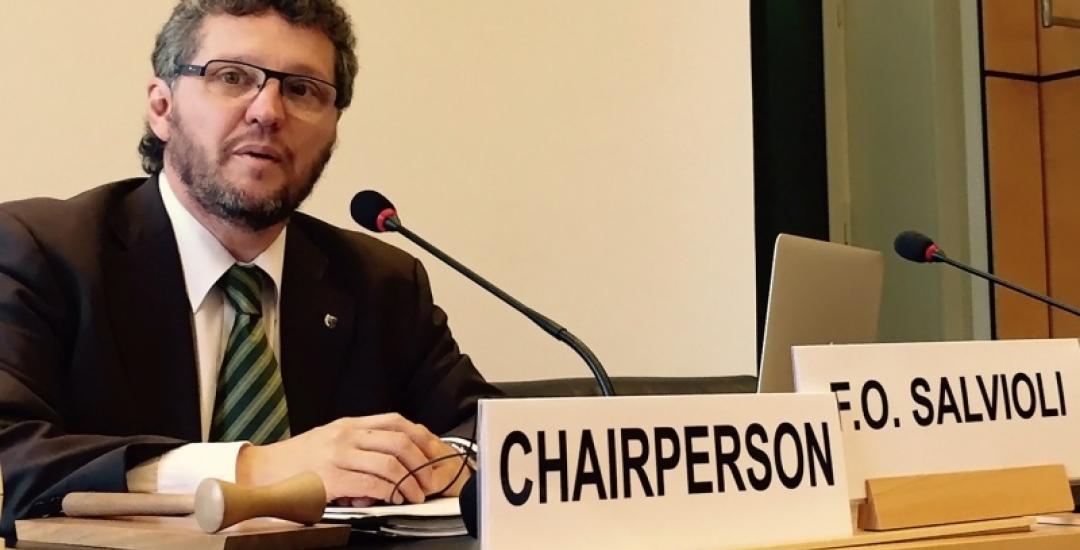
As a State Party to the International Covenant on Civil and Political Rights (ICCPR), Kuwait will be reviewed by the Human rights Committee (HRCtee) during its third review in July this year. The HRCtee, a monitoring body of 18 independent experts, will discuss the country's implementation of the rights enshrined in the ICCPR. In this regard, the HRCtee adopted, on 4 December 2015, a list of 27 issues to be discussed during the review. Among the main concerns raised is compulsory DNA collection, the death penalty and the practice of torture, discrimination against Stateless persons known as the Beduns, the lack of independence of the judiciary and the violent crackdown on peaceful gatherings severely restricting the right to freedom of speech and assembly.
The List of Issues aims at guiding the country in its preparation for a constructive dialogue during the review, when the Kuwaiti delegation will be requested to address issues of particular concern for the UN and civil society organisations. Prior to the adoption of the List of Issues, Alkarama contributed with its submission to the list of issues in which it raised major human rights concerns in the country. As a State party to the ICCPR since 1996, Kuwait was reviewed twice before by the HRCtee in 2000 and 2011 and its 2014 national report is now up for review.
Compulsory DNA Collection
In its List of Issues, the Committee addressed Law No. 78/2015, adopted as a part of the counter-terrorism legal framework that provides for general and compulsory DNA collection. Alkarama had stated in its submission that such a law is in stark violation of the right to privacy enshrined in article 17 of the ICCPR and should therefore be repealed. The Committee requested that Kuwaiti authorities to "explain how this law is in compliance with the State party's obligations under the Covenant."
The practice of death penalty and torture
Another issue raised by the Committee was the use of the death penalty. The Committee demanded to know "whether measures [were] taken towards the abolition of the death penalty" and asked the Kuwaiti authorities to "provide an exhaustive list of offences punishable by the death penalty and clarify whether there has been any comprehensive review of relevant legislation to ensure that the death penalty be imposed only for the most serious crimes." Torture was also amongst the concerns raised as the Committee requested clarifications on "steps taken to adopt a definition of torture that is in full compliance with article 1 of the Convention against Torture (UNCAT)."
Discrimination against the Stateless Beduns
Furthermore, the issue of the discrimination against the Stateless Beduns was raised both by the HRCtee and Alkarama. These individuals, who account for more than 120,000 people in Kuwait, suffer from a wide range of civil and political rights' violations, such as restraints from participating in election and on freedom of movement in and outside Kuwait. In this regard, the HRCtee requested the country to "provide information on measures taken to end all forms of discrimination against the so-called Bedun residents, providing them with identity and travel documents and integrating them into society."
The lack of independence of the judiciary
Moreover, the lack of independence of the judiciary was yet another concern raised in the adopted list of issues. Even though Kuwait was one of the first countries in the Gulf which adopted a Parliament and a Constitution, the executive often plays an overriding role. This was exemplified by the cases of Dar Al Watan Newspaper and Dar Al Watan TV Channel which both lost their licence due to their liberal reporting style, as Alkarama reported in an urgent appeal to the Special Rapporteur on the promotion and protection of the right to Freedom of Opinion and Expression (SR FRDX) in July 2015. The HRCtee requested the Kuwaiti authorities to "provide information on measures taken to ensure, in law and practice, the full independence and impartiality of the judiciary from the executive branch."
Restrictions on the freedom of expression and peaceful assembly
Finally, the HRCtee raised further concerns regarding the freedom of expression and peaceful assembly, and requested the Kuwaiti authorities to "provide responses to reports of arbitrary restrictions on freedom of expression and assembly in practice, including excessive use of force by law enforcement officers to disperse peaceful assemblies." In its report to the UN experts, Alkarama had observed a violent crackdown of peaceful gatherings, even though the right to peaceful assembly is partly guaranteed by Kuwait's Public Gathering Law No. 65/1979. Alkarama reported, amongst others, the case of Fawaz Al Anzi, Secretary General of the International Association of Rights and Freedoms (IARF), a network promoting social justice and human rights, who was arrested and beaten up after taking part in a peaceful demonstration on 7 July 2014. Alkarama has also witnessed an alarming trend in persecution of individuals criticising the State or its institutions, contrary to Article 19 of the ICCPR, which states that restrictions can only be legitimate if strictly necessary.
Kuwait is to provide its response to the List of Issues to the HRCtee before its 117th session, when the UN experts will assess the implementation of the ICCPR in the country. In this regard, Alkarama will contribute to the review by submitting an alternative report and meet with the HRCtee's experts to brief them about our main concerns. Alkarama urges the Kuwaiti authorities to seriously consider the adopted issues and carefully prepare their replies, in order to contribute to a constructive dialogue during the review.
For more information or an interview, please contact the media team at media@alkarama.org (Dir: +41 22 734 1008).
